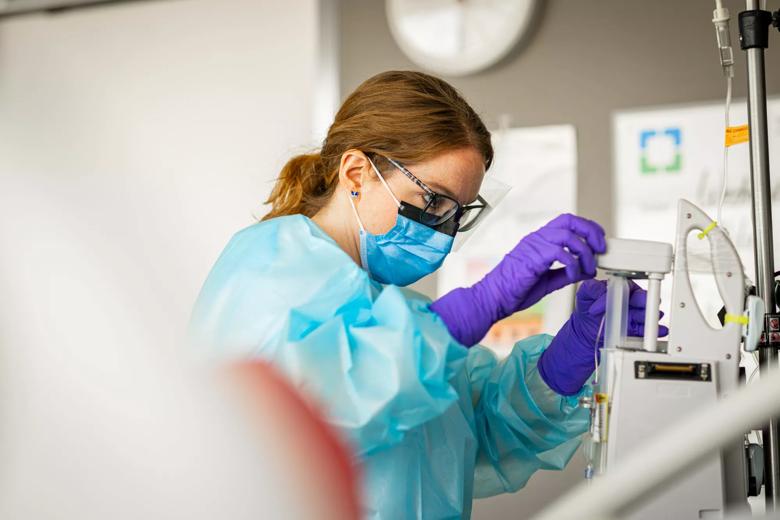Patient is first person dosed in clinical trial


Image content: This image is available to view online.
View image online (https://assets.clevelandclinic.org/transform/9421ce27-2b9b-455a-ba36-2d4db67ad881/MyPeak-1-Photo-2-scaled_jpg)
Research nurse coordinator Danielle Kellner readies the infusion.
Cleveland Clinic has infused a new gene therapy to deliver a working gene to address the leading cause of hypertrophic cardiomyopathy (HCM) in the first patient in the world as part of a clinical trial.
Myosin binding protein C3 (MYBPC3) gene mutations are the most common genetic cause of HCM. The gene therapy is designed to deliver a working MYBPC3 to the heart muscle through a one-time infusion of TN-201, which is a first-in-class adeno-associated virus-based gene therapy. The hope is that this new gene will restore normal levels of the protein, which regulates the contraction and relaxation of the heart muscle. In preclinical studies, a single dose restored normal levels of the protein which led to disease reversal.
Hypertrophic cardiomyopathy is a complex type of heart disease that causes thickening of the heart muscle, left ventricular stiffness and mitral valve changes. It affects an estimated 600,000 to 1.5 million Americans, or one in 500 people, but many of those patients go undiagnosed until the disease has progressed.
The cause of hypertrophic cardiomyopathy may be unknown or attributed to genetics, high blood pressure or aging, making it difficult to identify a high-risk population. Symptoms include chest pain, palpitations, shortness of breath, fatigue and syncope (fainting). Most people with hypertrophic cardiomyopathy have a low risk for sudden cardiac death. However, the condition is the most common cause of sudden cardiac death in people under age 30.
“Our understanding of HCM has progressed and we are excited to be a part of combining that knowledge with technology like gene therapy to further it even more” said Milind Desai, M.D., M.B.A., director of the Hypertrophic Cardiomyopathy Center at Cleveland Clinic and vice chair, Heart Vascular Thoracic Institute, Cleveland Clinic. Dr. Desai is an investigator for the MyPeak-1 Phase 1b clinical trial. “We look forward to continuing to study this therapy that involves a patient population that is often underdiagnosed and can suffer debilitating symptoms and sudden death.”
There is currently only one disease-specific medication to treat hypertrophic cardiomyopathy. Mavacamten, a medication that was approved by the FDA in April 2022, following a trial led by Cleveland Clinic, is used to treat the obstructive form of HCM and reduce the need for invasive procedures. Surgical options include septal myectomy, in which a surgeon removes a small amount of the thickened septal wall to widen the outflow tract (the path the blood takes) from the left ventricle to the aorta. Another option is alcohol ablation, a cardiac catheterization procedure where a tiny amount of pure alcohol is injected into the septum, causing it to shrink back to a more normal size and widens the passage for blood flow. However, there are few high-volume centers performing these, which may limit a patient’s access and may require repeat interventions.
The patient in this clinical trial, a 27-year-old woman, was dosed this week and is doing well. The MyPeak-1 Phase 1b clinical trial is a multi-center study designed to assess the safety and clinical efficacy of this one -time infusion. The trial aims to enroll at least six symptomatic adults who have been diagnosed with MYBPC3-associated nonobstructive HCM and have implantable cardioverter defibrillators.
The trial is sponsored by Tenaya Therapeutics Inc.
Dr. Desai is a paid consultant for Tenaya Therapeutics Inc., and Bristol Myers Squibb.
Cleveland Clinic is a nonprofit multispecialty academic medical center that integrates clinical and hospital care with research and education. Located in Cleveland, Ohio, it was founded in 1921 by four renowned physicians with a vision of providing outstanding patient care based upon the principles of cooperation, compassion and innovation. Cleveland Clinic has pioneered many medical breakthroughs, including coronary artery bypass surgery and the first face transplant in the United States. Cleveland Clinic is consistently recognized in the U.S. and throughout the world for its expertise and care. Among Cleveland Clinic’s 82,600 employees worldwide are more than 5,786 salaried physicians and researchers, and 20,700 registered nurses and advanced practice providers, representing 140 medical specialties and subspecialties. Cleveland Clinic is a 6,728-bed health system that includes a 173-acre main campus near downtown Cleveland, 23 hospitals, 280 outpatient facilities, including locations in northeast Ohio; Florida; Las Vegas, Nevada; Toronto, Canada; Abu Dhabi, UAE; and London, England. In 2024, there were 15.7 million outpatient encounters, 333,000 hospital admissions and observations, and 320,000 surgeries and procedures throughout Cleveland Clinic’s health system. Patients came for treatment from every state and 112 countries. Visit us at clevelandclinic.org. Follow us at x.com/CleClinicNews. News and resources are available at newsroom.clevelandclinic.org.
Editor’s Note: Cleveland Clinic News Service is available to provide broadcast-quality interviews and B-roll upon request.